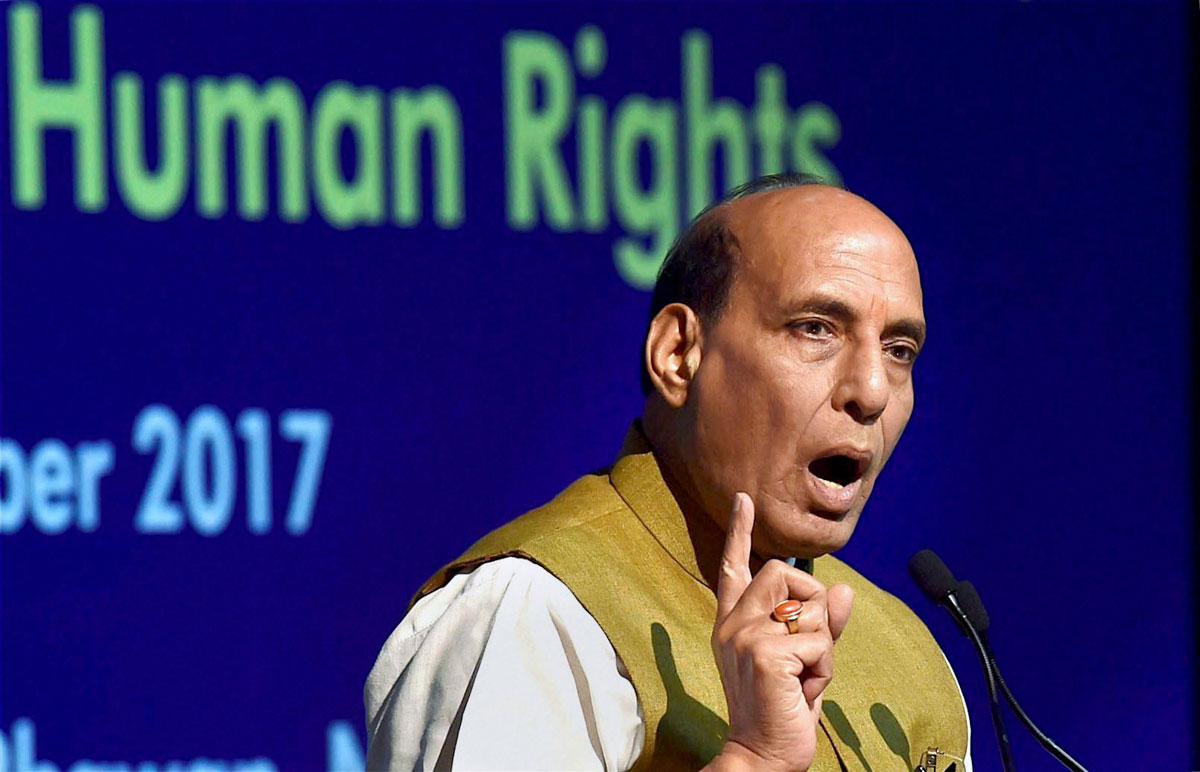Rohingyas, Illegal Immigrants, Not Refugees: Rajnath
Indian Home Minister Rajnath Singh addressing a seminar on “Good Governance, Development and Human Rights” organized by the National Human Rights Commission in New Delhi, Sept. 21. (Atul Yadav/PTI)
Indian Home Minister Rajnath Singh said, Sept. 21, Rohingyas are not refugees who have applied for asylum in India but illegal immigrants who “will be deported.”
Addressing a seminar organized by the National Human Rights Commission (NHRC), a tough-talking Singh asked why some people were objecting to the deportation of Rohingyas when Myanmar was ready to accept them.
“The Home Ministry has clarified its position through its affidavit (in Supreme Court) that these are illegal immigrants and they will be deported. The Rohingyas are not refugees.
There is a procedure to get refugee status and none of them followed this procedure.
“No Rohingya has got asylum in India nor anyone has applied for it. They are illegal immigrants,” he said.
Rohingyas are minority Muslims in western Myanmar and have been fleeing their homes following an army crackdown on their villages that has left hundreds dead.
The home minister said India would not be violating any international law if it deports Rohingyas as it is not a signatory to the UN Refugees Convention 1951.
The NHRC recently issued a notice to the Center over its plan to deport Rohingyas, who live in various parts of India.
The government told Parliament, Aug. 9, that more than 14,000 Rohingyas, registered with the UNHCR, stay in India.
However, aid agencies estimate there are about 40,000 Rohingyas in the country.
According to NHRC, its “intervention is appropriate” from the human rights angle.
The home minister said some people had again raked up the issue of human rights of Rohingyas who came to India illegally.
“We have to think about the human rights of our own people before talking about the human rights of people from other countries,” he said.
Any sovereign country, the minister said, was free to take a decision on what kind of action it should take against illegal immigrants.
“The issue of national security is involved with regard to illegal immigration which our country can’t undermine,” he said.
He also referred to Myanmar state counsellor Aung San Suu Kyi’s statement two days ago that her country would resettle some of the refugees.
“I am sure Myanmar will take positive steps to take back the Rohingyas.”
Singh said some people had termed the deportation process of Rohingyas wrong by referring to the ‘non-refoulement principle,’ which forbids a country receiving asylum seekers from returning them to a country in which they would be in likely danger of persecution.
“But I want to tell them that the non-refoulement principle is applicable to those who take asylum. No Rohingya has got asylum in India nor have they applied for it. That is why we should not commit the mistake of according the status of illegal immigrants as refugees in the name of human rights,” he said.
However, India had provided humanitarian assistance to Rohingyas living in Bangladesh, which was also affected by the illegal immigration of Rohingya, Singh said.
On Sept. 14, India sent 53 tons of relief material to Bangladesh for Rohingyas, who poured into that country following the violence in Myanmar.
Hundreds of thousands of Rohingya Muslims, described by the UN as the most persecuted minority in the world, fled their homes in Rakhine state recently to escape a military crackdown. It seemed a “textbook example of ethnic cleansing,” UN human rights chief Zeid Ra’ad Al Hussein said.
Human rights group Amnesty International has blamed Myanmar’s State Counsellor Aung San Suu Kyi and the country’s government for “burying their heads in the sand over the horrors unfolding in Rakhine State.”


